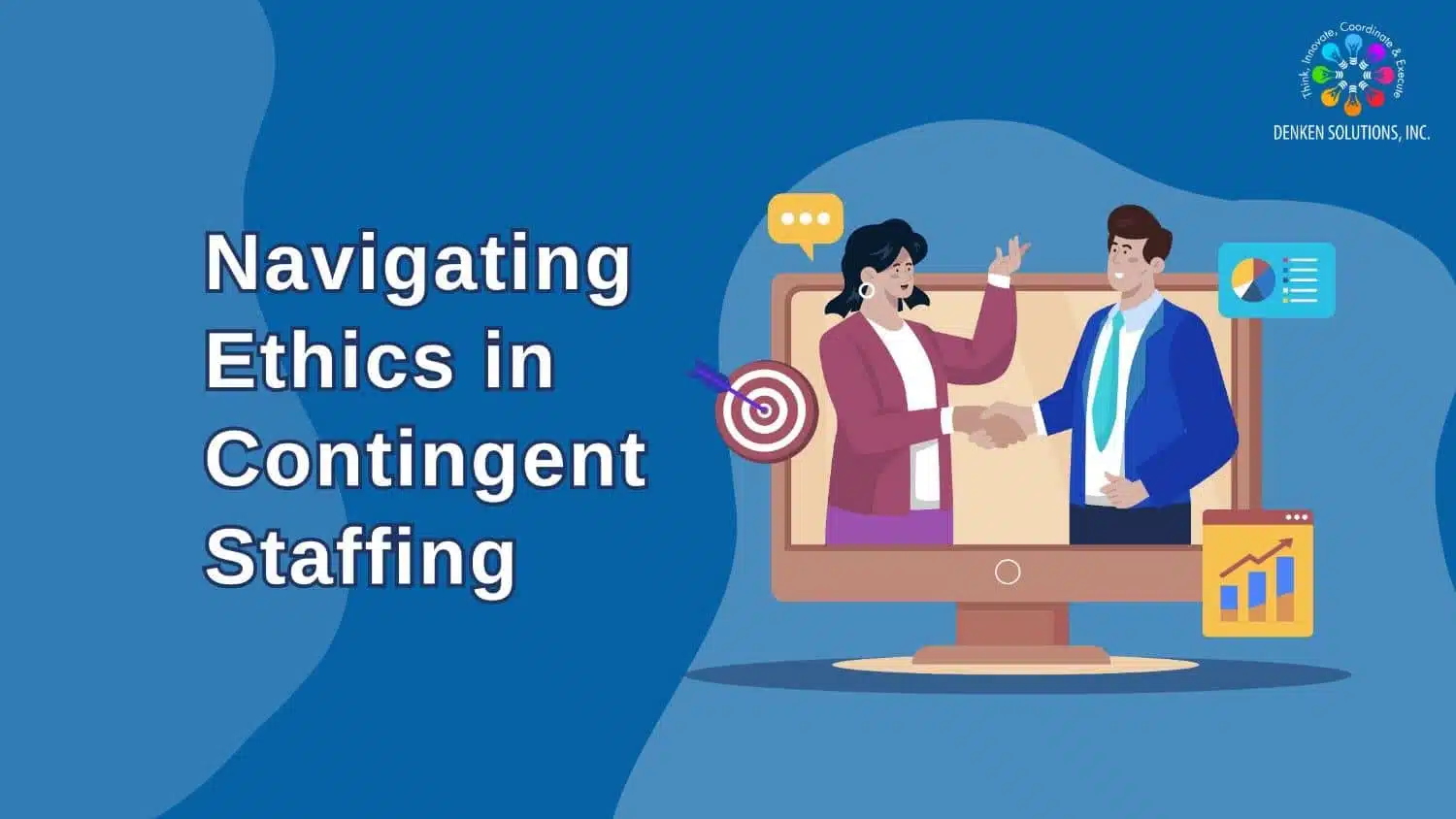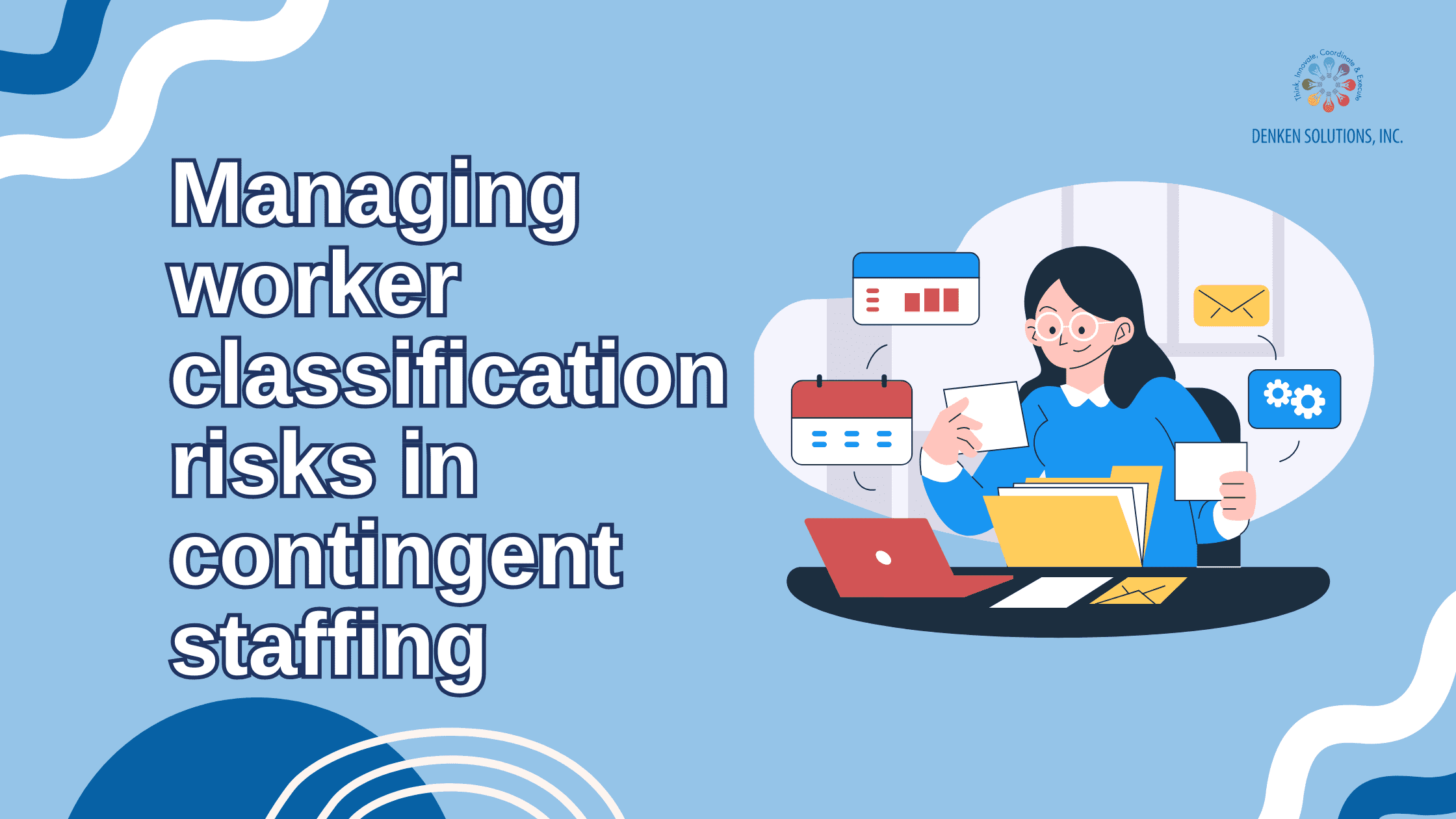The rise of the gig economy has changed the fundamentals of the way a business engages with talent and contract-based workers, which includes freelancers, temporary staff, and contractors, thus becoming an integral part of multiple industries. This shift will offer businesses cost-efficiency, flexibility, and access to specialized skills. However, as temporary staffing continues to grow, it will bring with it a host of ethical challenges that must be carefully addressed.
From ensuring worker rights and fair compensation to navigating the job security and mental health concerns, the gig economy will require businesses to adopt ethical practices to support and protect their temporary workforce. In this blog, we will explore the key ethical considerations in contingent staffing and highlight the best practices that contingent workforce companies can implement to create a fair and sustainable working environment for gig workers.
Ethical considerations of contingent staffing in the gig economy:
The gig economy has transformed the way businesses are hiring talent, thus providing more flexibility and cost-saving opportunities. However, as contingent staffing is growing, there are various ethical hiring practices that businesses should address. Here are some of the most prominent ethical issues related to temporary staffing in the gig economy:
1. Pay equity and fair compensation:
Contract-based workers tend to face unequal pay when compared to full-time employees doing the same work. Moreover, their compensation is quite inconsistent, thus making it tough to budget and plan for their financial future. Some businesses will take advantage of the flexibility temporary workers provide by offering lower wages or inconsistent pay structures. Companies should ensure fair pay by offering competitive wages aligned with industry standards, with clear and transparent payment terms.
2. Stability and job security:
Unlike the full-time employees, gig workers will not have any job security or long-term employment guarantees. Their roles are usually project-based or temporary, which leaves them uncertain about future work opportunities. Lack of stability could cause financial strain for workers, which leads to stress and a lack of long-term career growth. Businesses offer opportunities for future work, maintain transparent communication about the possibility of long-term roles, and provide clear contracts to improve job security.
3. Worker rights and classification:
Contract-based workers are classified as independent contractors, which means they are excluded from multiple labor protections like health benefits, sick leave, and unemployment insurance. It is unethical to misclassify employees to avoid offering benefits or protections. The legal safeguards that many temporary workers are entitled to are not being provided. Companies must make sure they are correctly identifying workers as either independent contractors or employees, according to labor regulations, and, when appropriate, offering the required benefits and protections.
4. Access to health care and other benefits:
Multiple gig workers lack access to important benefits like healthcare, retirement plans, and paid time off. Offering temporary workers a job without benefits could lead to personal and financial hardships, especially for those with family and medical needs. Companies have to consider offering paid sick leave, healthcare stipends, or access to a retirement plan, or connect workers with third-party benefit options to help reduce disparities between full-time and contract-based employees.
5. Communication and transparency:
One of the most common issues with contingent staffing is a lack of clarity and transparency in job expectations, contract terms, and compensation. Miscommunication could lead to dissatisfaction, confusion, and frustration about pay, roles, and job responsibilities. Companies should prioritize clear communication about roles, expectations, job details, and compensation. Written contracts should be clear and thorough to ensure both parties are on the same page.
6. Well-being and mental health:
Temporary workers in the gig economy are frequently under pressure to look for new opportunities all the time, which can cause stress and burnout. Furthermore, the remote nature of freelancing might exacerbate feelings of neglect or loneliness. Contract-based workers’ mental health and job happiness may suffer if they feel alone or unsupported. By fostering work-life balance, providing mental health resources, and allowing for frequent breaks and flexible scheduling, employers may promote the mental health of gig workers.
Best practices for managing contingent workers:
As the gig economy is growing, managing the temporary workers efficiently has become important for businesses that are looking to elevate flexible talent while also maintaining high standards of productivity and workplace morale. Given below are the best practices that organizations can adopt to ensure the fair treatment of gig workers:
1. Evident contracts and expectations:
From the very start, ensure that gig workers understand the roles, performance metrics, and responsibilities. A clear contract should outline the major details like work hours, pay rates, deadlines, and expected outcomes. Formal contracts will protect both parties and reduce misunderstandings. Ensure that the contract will specify the duration of the engagement, confidentiality agreements, and payment terms.
2. Open communication:
Maintain clear lines of communication with the temporary workforce. Regular check-ins will provide opportunities for feedback, address concerns, and ensure that the worker is staying on track. This will ensure workforce sustainability in the long run. Create avenues for real-time feedback and allow workers to voice any issues or challenges they might have to deal with during work. This will help create a collaborative and positive environment.
3. Fair and competitive compensation:
Ensure that gig workers are paid based on the skills, industry standards, and the work they deliver. You should also pay equity between temporary workers and full-time employees who do similar work to ensure fairness. Gig workers, especially freelancers, should rely on regular and timely payments. Ensuring that the payment terms are clear and the payments are made on time will build trust and loyalty.
4. Enable access to training and access:
Provide temporary workers with access to relevant training or resources to help them succeed. This will include enabling access to internal tools, systems, and platforms they might need to perform their roles better. You should onboard contingent workers properly to integrate them into the company’s workflow and culture. Provide necessary training on the company’s processes, tools, and software to ensure that they are fully prepared.
5. Offer work-life balance and flexibility:
One of the primary reasons workers choose temporary work is the flexibility it tends to offer. You should allow your contingent workers to set their schedules or work remotely when possible. Since gig workers are usually engaged for specific projects or tasks, ensure that they are not overburdened with excessive work outside the original scope of the agreement.
Discover how our contingent staffing solutions can drive success for your company.
How does Denken Solutions ethically manage contingent workers?
At Denken Solutions, we understand the value of contingent workers in a business. We prioritize ethical management practices to make sure that the temporary workforce is treated with fairness, respect, and transparency. Here is how we help businesses to manage the contract-based workers while also maintaining high ethical standards:
1. Transparent payment and fair pay:
We make sure that gig workers are paid as per the aligned industry standards. Through transparent pay structures, we will offer competitive rates based on the worker’s skills, job requirements, and experience. At Denken Solutions, we guarantee that temporary workers are paid on time, thus helping build trust and maintain financial stability for them.
2. Clear worker classification and contracts:
At Denken Solutions, we ensure that workers are classified appropriately as per the labor laws, thus ensuring they receive the right legal protections and benefits. Every gig worker will receive a clear, well-defined contract that outlines the role, compensation, expectations, and duration of the employment. We work with businesses to create detailed contracts that comply with labor laws and therefore prevent misclassification, which ensures workers’ rights are protected.
3. Professional development and career growth:
At Denken Solutions, we believe in upskilling the contingent workers. We offer training opportunities, online courses, and workshops to help workers expand their skillsets and advance in their careers. We also enable mentorship opportunities to cultivate professional growth and ensure contingent workers are constantly learning.
4. Maintain transparent communication:
We ensure clear communication between contingent workers and businesses, thus setting expectations from the outset and providing regular feedback throughout the engagement. We encourage a culture where feedback is constructive and workers are given the chance to improve and develop. This way, contingent workers are informed, supported, and engaged throughout their assignments.
Ready to Get Started? Reach Out Today!
Conclusion:
Businesses must carefully and responsibly handle the ethical issues of contingent staffing as the gig economy continues to change the nature of the workforce. Maintaining a staff that feels appreciated and respected requires ensuring fair wages, job security, and worker rights. In addition to fostering a long-lasting and fruitful working relationship, ethical behaviors, including open communication, offering benefits, and encouraging work-life balance, also aid in establishing trust among gig workers.
Businesses may develop a devoted, driven workforce, promote equitable working conditions, and reduce potential dangers by giving ethical considerations top priority. In the end, implementing ethical hiring processes improves worker satisfaction while also bolstering a business’s brand and long-term viability in the fiercely competitive gig economy.



